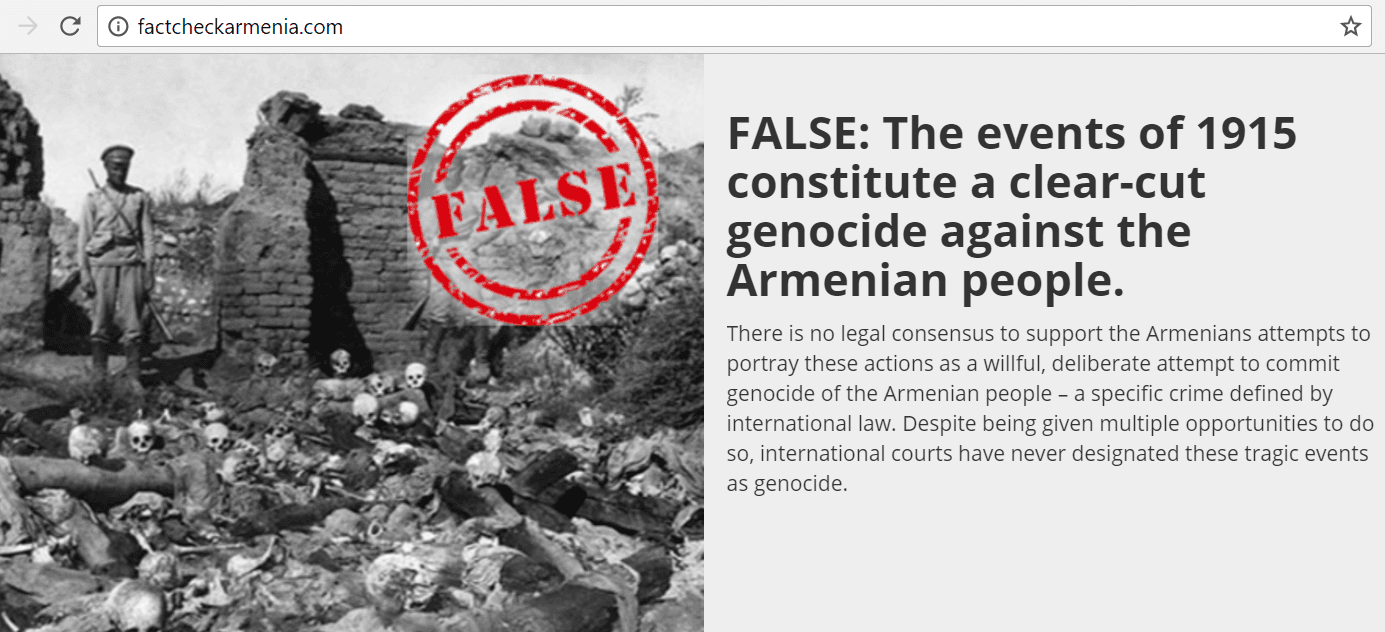Fake Fact-Checking Websites
Please Note: This page is under development.
Russia: In March 2018 RT (formerly Russia Today) set up FakeCheck
to "debunk fakes that are extensively distributed across the mainstream media." The development has not been universally welcomed. Indeed it met with sarcasm from some in the West. RT has itself been accused of spreading misinformation (a position it vigorously denies). [1]
Turkey: Similar concerns have been raised about Turkey's entry into fact-checking. The image below is a screen-dump from FactCheckArmenia.com
website which has hidden its sponsorship.
The website describes itself as "dedicated to exposing the real story about what happened in and before 1915. For too long, the Armenian diaspora has been a loud voice presenting its own version about what happened during these tragic events while neglecting the desperate situation their country finds itself in today. Fact Check Armenia is dedicated to providing accurate and reliable information to the world about the events that led up to and during 1915. It provides historical data on the Armenian uprisings that gave way to the Ottoman Turks’ actions and counters Armenian misinformation." For a discussion of who sponsors the website and what it has been doing, see here.

Czech Republic: In October 2017, in the Czech Republic, prime ministerial candidate Andrej Babiš created his own 'fact verification' project named 'Můj Demagog,' which translates as 'My Demagog.' The International Fact Checking Network's verified member in the country is Demagog.cz
and is based in Prague... People have speculated
on why the site was set up...
Sweden: In April 2018, a copycat version of Swedish fact-checker Faktiskt
launched two weeks before the real one did, publishing hyperpartisan stories that criticized fact-checkers. Faktiskt.SE (image on the right) is the real fact-checking website; Faktiskt.EU (image on the left) is the fake.
Mexico: More recently (June 2019) the government of President Andrés Manuel López Obrador in Mexico created its own fact-checking operation which “is designed to debunk false news on social media as well as to fact-check dubious content published by traditional media outlets.” The new service’s name, 'Verificado Notimex', is the same as several fact-checking initiatives in the country. Draw your own conclusions...[2]
India: The Press Information Bureau
in India (an arm of the Government) has also announced plans to set up a fact-checking unit to “identify and counter any fake news about the government and its policies circulating on social media platforms.” Details, including how the fact-checking service will work and when it will launch, aren’t yet clear...
These developments raise many questions, not least whether such initiatives
will discredit the fact checking movement by focusing on ideologically convenient material or rewriting history.[2]
Is there anything wrong with this page?
If you would like to comment on the content, style, or the choice or use of material on this page, please use the contact form. Thank you!
Notes
1 Interesting that Russia sets up a 'fake' check site (cf others' 'fact' check)... The following is a summary of an article
on FakeCheck. It notes that the new website is “supposed to be a platform for any fact check, but no surprise that all the examples debunk Western media." Whilst it is still early days (only 16 stories on the website as of Aug 2017) half deal directly with Russia’s image abroad or its foreign policy. The other articles touch on Russia Today
itself, Trump and Syria. But is selection bias a sin if the fact-checking is done correctly? Nonpartisanship is a core principle of fact-checking but selection is not a black-and-white matter.* Inside Russia, fact-checking projects such as Noodleremover
or Monitor Propagandy
concentrate their efforts on debunking state or pro-government media reports. Outside of Russia, the Ukrainian project Stop Fake
describes itself as an "an information hub where we examine and analyze all aspects of Kremlin propaganda." Voice of America
recently launched Polygraph, a service dedicated to fact-checking figures in or close to the Russian regime. The question is should FakeCheck
be given credit for debunking its part of the fake news pie, or "should the initiative be considered comparable to Turkey’s fake fact-checkers which actively peddle misinformation?" But perhaps a bigger problem is that FakeCheck
"mixes dubious fact checks among the legitimate ones, leading to unproven or poorly sourced conclusions." Peter Cunliffe-Jones, chair of the International Fact-Checking Network’s interim board has warned that "Alternative, partisan 'fact-checking' is incredibly damaging for society as it further undermines public trust in the reliability of all information. And agreement on what is reliable information is something we all need if we are to make our choices on anything other than gut instinct."
* MB/FC ranks RT News
as ‘Right-Center Bias’ and says its coverage is “highly biased toward Russia and occasionally runs Pro-state conspiracy stories” It also “promotes pro-Russian propaganda.” Media bias is discussed on another page. One final observation, the FakeCheck
website is unusual in design in that it offers no contact details…
2 In March 2018, more than 60 journalists and tech companies teamed up for a collaborative fact-checking project called Verificad, which aimed to tackle misinformation about Mexico’s general election. Its name was based on a previous effort, Verificado 19S, that tried to crowdsource real-time information about the earthquake that hit Mexico City in 2017. Then there’s VerificadoMX, a regional fact-checking initiative that launched in the state of Monterey in July 2017. Its founder told Tardáguila that the project is ready to go to court against the López Obrador administration to protect its registered brand. [The story is told here.]

